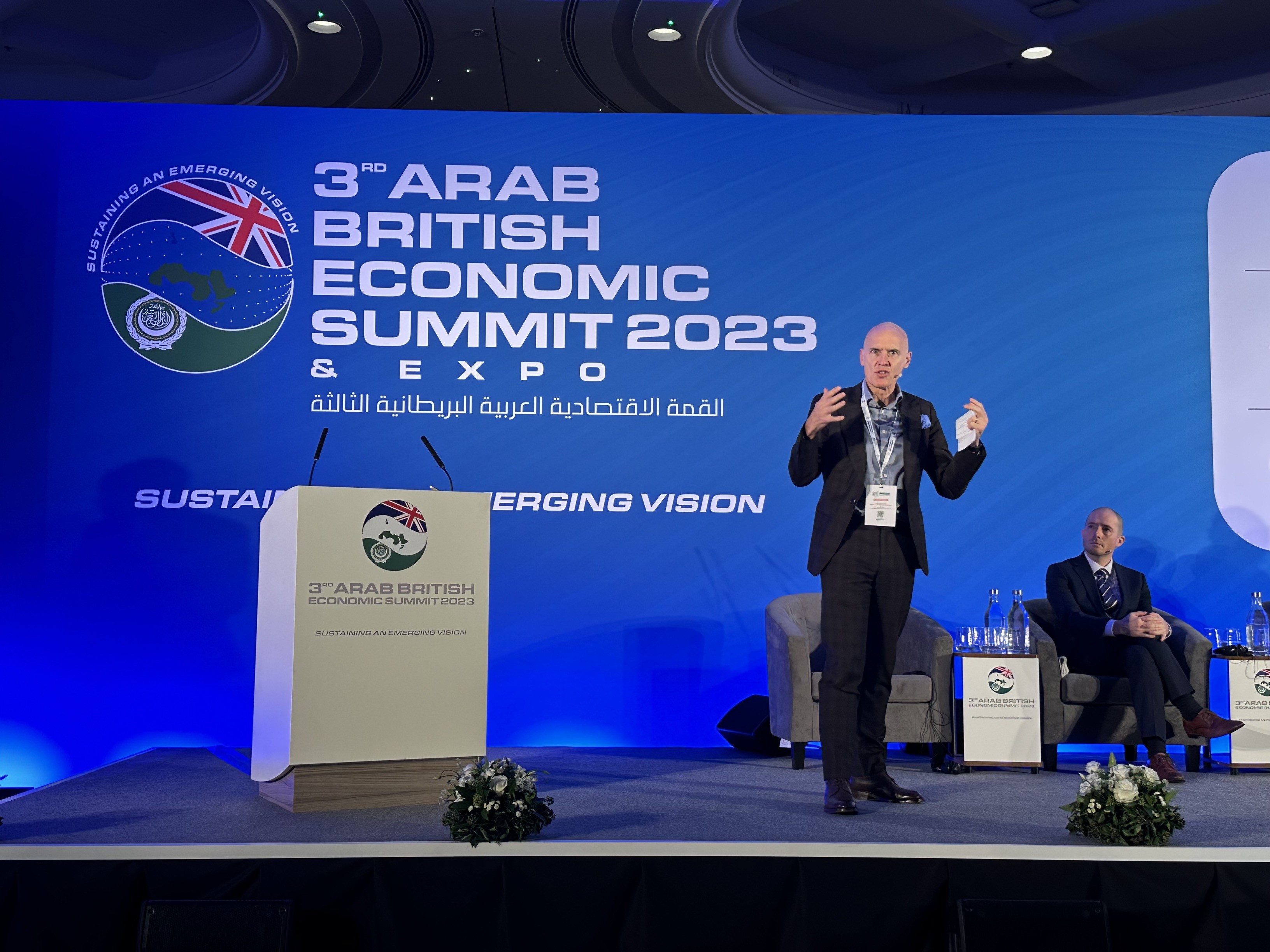
What does the future in e-commerce, AI and tech look like in the sphere of British trade with Gulf Cooperation Council (GCC) nations?
Institute of Export and International Trade (IOE&IT) director general Marco Forgione chaired a discussion on just this question at yesterday’s (20 November) Arab-British Economic Summit. The panel also discussed the progress being made on a UK-GCC free trade agreement (FTA).
Opening the discussion, Forgione made the case for trade and said there were few better people to discuss the picture of UK trade with GCC nations than Tom Wintle, the Department for Business and Trade’s (DBT) chief negotiator for the UK-GCC deal.
Harnessing the future
Wintle said the “economic opportunity is clear” for UK firms in Arab nations and explained his negotiating team is seeking a deal that can “harness what is happening today”, but also one that is designed to take advantage of future technological developments, particularly around the use of AI in e-commerce.
Quizzed by an audience member on the areas that pose challenges or benefits, Wintle said there were no particularly challenging sectors. He had more to say on the benefits, however:
“In terms of the initial analysis that we put out, we have a lot coming in the way of tariff reductions. There is a lot of potential on services, [shown in] the stats which are publicly available.”
Forgione said it was encouraging to hear there was such a “good appetite on both sides of the negotiations” for achieving a mutually beneficial deal.
E-commerce is “key” because it is the international “shop front” for many businesses, particularly small to medium enterprises (SMEs) that may be yet to export, he argued. It is for this reason, he added, that IOE&IT has been chairing the ongoing E-Commerce Trade Commission.
The challenges
Many western companies and their products have failed to make it into Middle Eastern markets where they could be successful because they are held back by a lack of information about the practicalities of exporting there, said Andrew Elia, managing partner at tech firm Arishi, on the same panel.
He highlighted some of the challenges faced by firms trying to get into markets such as that of Saudi Arabia. He noted that many of the payment providers operating in western markets are not yet present in the Middle East, explaining:
“There is a very limited choice of payment gateways, which then can impinge on e-commerce platforms. With the ones that you do have, you often find they don’t have the kind of service levels which you need to run a 24/7 business.”
Speaking elsewhere at the event to the Daily Update, Elia said that “doing business outside the UK always has its challenges”, and explained that the “barrier to entry is steep” in exporting to some parts of the Middle East.
Elia advised that firms need to “understand how other countries do things”, noting that apparent technological advancement can mask an “outdated process” of bureaucracy in some GCC nations that can make for a sometimes difficult trading environment.
AI advantage?
Major General Paul Nanson of the London Strategy Centre drew on his years of military experience to talk about the power of new technology to improve decision-making – even in the business sphere.
AI solutions could help “predict and support” people in making “courageous leadership decisions”, he contended.
Following him was the session’s final speaker, Business School England’s Professor Dominic Palmer-Brown.
An “energetic advocate for collaboration between business and the university” in Forgione’s words, Palmer-Brown built on Nanson and Wintle’s words to say that, though it was a cause for fear among some, AI presents a major opportunity.
In educating the workers of the future, it is fruitless to expect students not to use AI, he argued, making reference to concerns around how some are already using it.
“We have to embrace this, to ask them to explain what AI has done. The key idea is learning adaptation, adapting it to improve the experience.”
E-Commerce Trade Commission
The E-Commerce Trade Commission, mentioned by Forgione, was convened in June 2023 and counts some of the world’s largest ecommerce platforms – including Amazon, Alibaba, eBay, Google and Shopify – among its members.
The Commission has a two-year remit and three main objectives:
- Simplification – publish two evidence-based reports on how to address existing trade barriers, simplify pathways to trade and incentivise SMEs to do more international ecommerce
- Perception – monitor international demand for and supply side perceptions of the UK’s traders, benchmarking and measuring SMEs ability to trade through regular surveys
- Promotion – reach 70,000 SMEs that could, but currently don’t, export online through campaign events, educational content and case studies



